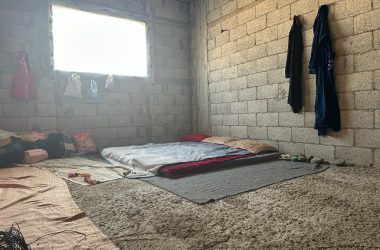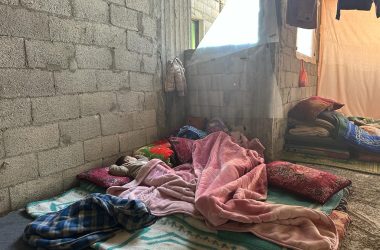Nihal al-Ghandur Salah (40), mother of four
Btselem /31 December 2023
I lived with my husband and our children, Sama, 11, Karim, 9, Zeinab, 7, and Salma, 4, in my family’s building in Mashru’ Beit Lahiya north of Gaza City, close to the market. I worked at a school as a math teacher and my husband was unemployed.
When the war first started, we stayed at home. But on 18 November 2023, a shell fell on our building and we all left: me, my husband and kids, my parents, my sisters Samar and Nada, and my brothers Shadi, Muhammad and Mahmoud with their families – 25 people altogether. At first we went to Jabalya Refugee Camp. I stayed with my husband and kids and a few other family members with the al-Madhun family for two days, and then for another two days at the home of relatives from the Abu Diyah family.
They told us we were in an Israeli military detention facility. Every time I moved, I got hit on the head
On 22 November 2023, I left the Abu Diyahs’ home with the kids, my sister Samar, Shadi’s wife, their kids and her aunt, Tammam Abu Diyah. We headed south, until we reached the checkpoint the army set up in the Netzarim area. The soldiers ordered us to sit on the ground. I sat down on the sand with Shadi’s girls, Rose, Mai and Sarah. Then they called out to Samar and told her to go behind a fence, and then they told me to go there, too. I was told to take my clothes off, and I stayed in my underwear. Then they let me get dressed again, and I sat down next to Samar. They covered our eyes. Samar asked who was sitting next to her, and I said it was me. Two hours later, I called out to her again, and she didn’t answer. I didn’t know where she was.
In the evening, they took me and about 15 other women they arrested to another place. They told us we were in an Israeli military detention facility. Every time I moved, I got hit on the head. Every time I heard soldiers’ voices, I was afraid I’d get hit again. They kept cocking their weapons to scare us. Every time I heard that, I recited the “shahadatein” because I was sure they were going to shoot me. Our hands were tied in zip ties the whole time.
People in civilian clothes, I think Shin Bet agenst, interrogated me four or five times. Every time, the zip ties were replaced with metal handcuffs for the duration of the interrogation. They asked me about the hostages and the tunnels, where they were, about security cameras. One of the interrogators kept shouting at me and swearing at me.
They didn’t let us sleep and forced us to stand, in the cold, in rooms with tin walls. They humiliated us all the time. Sometimes, they put the food outside the room so we couldn’t reach it, and then animals came and ate it. They shouted and swore at us all day long. The toilets were disgusting, and I felt the water they were giving us wasn’t fit for drinking.
There were female soldiers or prison guards there who abused us, physically and mentally
On Wednesday, 29 November, they told us: “Yalla, off to Gaza.” They blindfolded us and took us to a prison. They told us it was Damun Prison. They interrogated us there too, asking the same questions. I met female prisoners from the West Bank there, and also four detainees from Gaza who were arrested with us and brought there two days earlier. There were female soldiers or prison guards there who abused us, physically and mentally. They kicked us, pulled our hair, humiliated us and shouted at us.
They kept me there for almost two weeks, until Monday, 11 December 2023. Then they called me and another detainee and told us we were being released. They covered our eyes, tied our hands and drove us for three hours to the detention facility I was in at first. I was interrogated there again, and badly beaten. They humiliated me and pulled my hair. I was in despair. I lost all hope they’d let me go.
On Thursday, 14 December 2023, in the evening, they called me and four other women from Gaza and made us stand outside in the cold and rain, far away from each other, for five hours. When we asked them why they were keeping us there, the soldiers shouted and swore at us.
After midnight, they blindfolded and handcuffed us and put us on a bus that drove us to the Kerem Shalom crossing. At the crossing, we met workers who were arrested in Israel and being taken back into Gaza, and they told us where we were. It was only then that we realized we were being released.
I came back physically and mentally exhausted. I could barely walk [...] when I entered the Gaza Strip, I was shocked by what I saw, all the displaced persons
I came back physically and mentally exhausted. I could barely walk, and was in a really bad state psychologically after everything I’d been through in prison. When I entered the Gaza Strip, I was shocked by what I saw, all the displaced persons and the condition they were in. I called my family and when I reached them, I found out they were all living in some storage space, practically on top of each other – it was so crowded. There’s barely any food and water. My children were in really bad shape. They’d been through horrible things, and I wasn’t there with them. They got the flu and had from diarrhea and intestinal infections. They didn’t even have a change of clothes. I went looking for clothes to buy for them, but couldn’t find any. I don’t have any clothes either, and I’m still wearing the sweatpants they gave me in prison. My husband and I found a building under construction and moved into an apartment there, which has no windows yet. We covered the openings with plastic sheeting.
I can’t get over what happened to me. The shame of being seen almost naked and the state my children are in.
* Testimony collected by B’Tselem field researcher Muhammad Sabah on 31 December 2023

